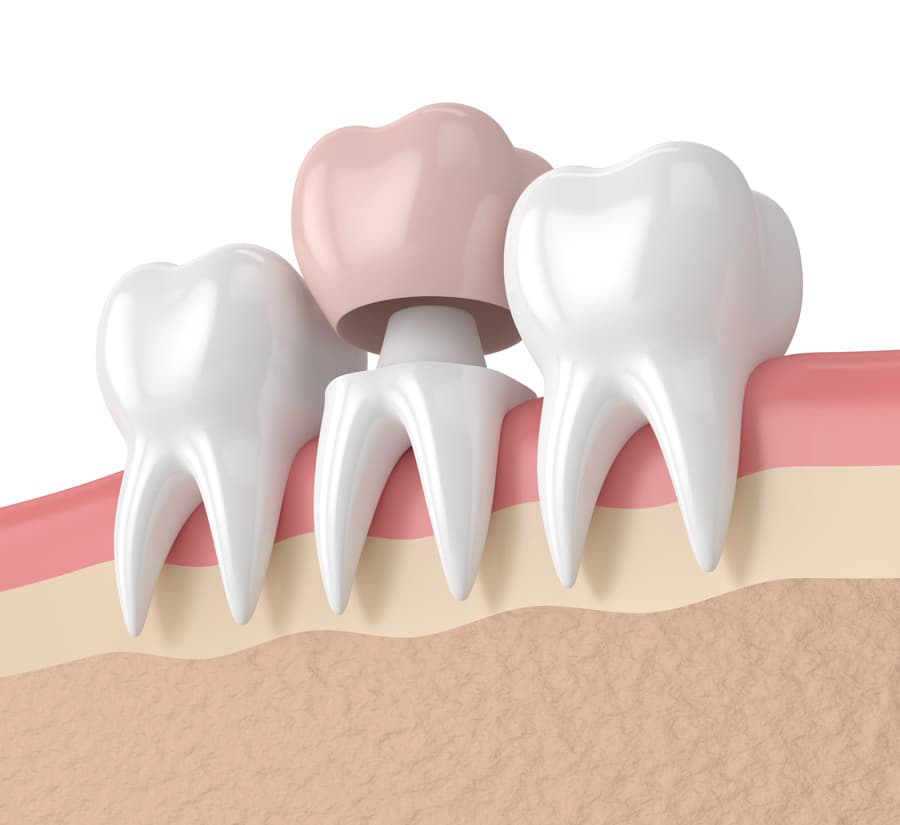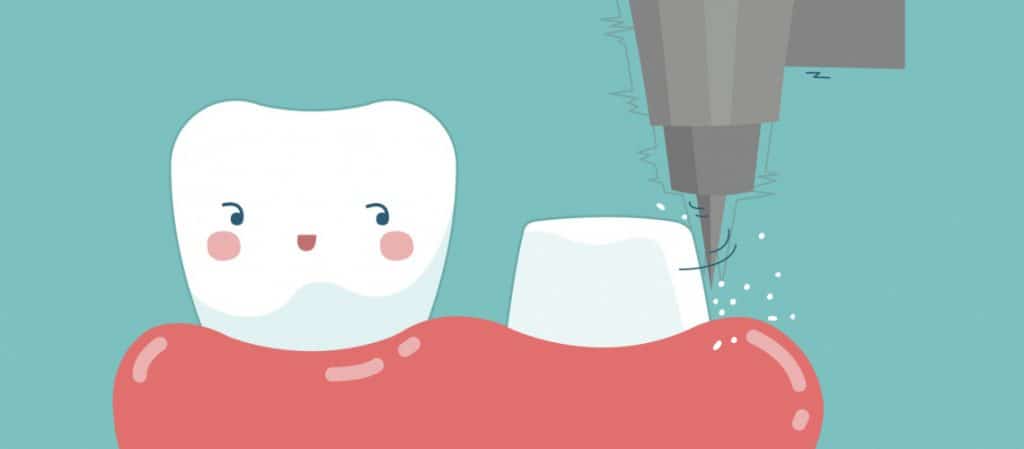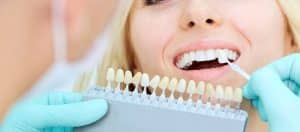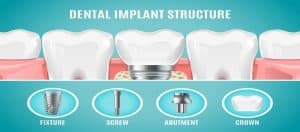Veneers vs Crowns: When Would We Use Which?
When it comes to dental restoration, two of the most popular options are veneers and crowns. Both can be used to improve your smile’s appearance, but each has advantages and disadvantages. So, how do you know which restoration procedure is the best for you?
Your dentist must evaluate your case to help you make an informed decision. Factors that will be considered include tooth damage, bite alignment, and oral health. Here is a general overview of when veneers vs. crowns might be recommended:
Veneers are typically used for cosmetic purposes. For example, they can cover up minor imperfections, such as chips or cracks. Veneers are also sometimes used to change the shape or colour of your teeth.
On the other hand, crowns are usually recommended for more significant dental problems. For example, if you have a tooth that is severely decayed or damaged, a crown can help restore its function and strength. Crowns can also be used to support a dental bridge.
Veneers are less invasive than crowns and can often be completed in just one or two dental visits. On the other hand, crowns require more extensive work and may need to be custom-made for your mouth.
Dental Veneer Procedure
If you and your dentist decide that veneers are the best option, the next step is to prepare your teeth. First, a small amount of enamel will be removed from the front surface of your tooth. This is necessary to make room for the veneer. Once your tooth is prepared, an impression will be taken so the veneer can be custom-made to fit your mouth.
It takes about 15 days for the veneer to be fabricated. In the meantime, you will likely be fitted with a temporary veneer. Once your permanent veneer is ready, you will return to the office for a second appointment. The temporary veneer will be removed during the next visit, and your new veneer will be bonded to your tooth.

Crown Procedure
If you require a crown, the first step is like getting a veneer. Next, a small enamel part will be removed from the tooth to place the crown. Once your tooth is ready, an impression will be taken to prepare a customised crown.
Like veneers, the crown typically takes about two weeks to be fabricated. In the meantime, you may be fitted with a temporary crown. The temporary crown will be removed during your next appointment, and your new crown will be cemented.
Veneers vs. Crowns: Which Is the Ideal Option for You?
The best way to determine whether veneers or crowns are right for you is to consult your dentist. They will be able to evaluate your teeth and recommend what will best restore your smile.
Advantages of Veneers
- Cosmetic Enhancement: Veneers excel at improving the appearance of teeth, especially for cosmetic issues like staining, discolouration, minor chips, and gaps.
- Minimal Tooth Reduction: They require less removal of natural tooth structure compared to crowns, preserving more of your tooth.
- Faster Results: Veneer placement typically involves fewer dental visits and offers a faster way to achieve a transformed smile.
- Stain-Resistant: Porcelain veneers resist stains, helping maintain a bright smile even when consuming staining substances.
- Customisation: Veneers are custom-made to match your desired tooth colour, shape, and size, ensuring a personalised and natural look.
Advantages of Crowns
- Restoration of Function:Crowns are primarily used to restore damaged or weakened teeth, providing strength and durability for better functionality.
- Better Coverage: They encase the entire visible portion of a tooth, making them suitable for more extensive structural issues.
- Protection: Crowns protect teeth from further damage and decay. Thus, preventing the need for more extensive dental work in the future.
- Versatile Option:Dental crowns can address cosmetic and functional concerns, making them highly versatile.
- Durability: They are known for their long-lasting durability and can withstand the forces of chewing and biting for many years.
The Care for Veneers and Crowns
VVeneers and crowns are made from different materials. The most common type of veneer is porcelain, while crowns can be made from metal, ceramic, or porcelain.
Porcelain veneers don’t stain easily like other types of veneers. However, they are more fragile and can chip or break if you bite down on hard objects. So, avoiding biting your nails or chewing on ice cubes with porcelain veneers is essential.
Crowns, on the other hand, are much stronger than veneers. As a result, they don’t break or chip easily but can still be damaged if you bite down on hard objects.
Veneers and crowns can last for many years with proper care. However, they may eventually need to be replaced due to wear and tear.
The Cost of Veneers and Crowns
The cost of veneers and crowns can vary depending on the materials used, the severity of your dental problem, and other factors. In general, veneers tend to be less expensive than crowns.
Veneers typically Veneers typically cost between $ 500 and $ 1,500 per tooth, while crowns usually cost between $ 1,000 and $ 3,000 per tooth. Be sure to discuss the cost of treatment with your dentist before having any work done.
Some dental insurance plans may cover some costs for veneers or crowns. However, most plans consider these treatments cosmetic and will not provide coverage.
If considering veneers or crowns, talk to your dentist about the best option. They can help you choose the proper treatment based on your dental problem and budget.
If you have any questions about veneers vs. crowns or want to schedule a consultation with Bay Street Dental Group experts, please get in touch with us today. Call us at (03) 9646 2577 or email [email protected] to fix an appointment. [email protected] to fix an appointment.
FREQUENTLY ASKED QUESTIONS
What are the side effects of veneers?
There are a few side effects that can occur with dental veneers. One of the most common is tooth sensitivity. This happens because the enamel is removed to place the veneers, exposing the dentin (the softer layer of teeth).
Another potential side effect is gum irritation. This can happen if the adhesive used to place the veneers isn’t compatible with your gums or if you have gum disease. Finally, in rare cases, a person’s bite may change after getting dental veneers. This is because veneers can alter the shape of your teeth and how they fit together when you close your mouth.
What Are the Side Effects of Crowns?
Dental crowns are tooth-coloured porcelain caps cemented over a natural tooth or dental implant. Crowns are custom-made to match the colour of your teeth and can last for many years with proper care. Dental crowns’ most common side effects are:
- Sensitivity to hot and cold.
- Pain when biting down.
- Gingivitis (inflammation of the gums).
IIn rare cases, a crown may fall off or fracture. If you experience any of these side effects, please contact your dentist.
What is the difference between veneers and crowns?
Many different dental procedures can be used to enhance the appearance of your teeth. Veneers and crowns are two of the most popular options. But what exactly is the difference between these two procedures? Veneers are thin, custom-made shells designed to cover your teeth’ front surface. They are usually made from porcelain or ceramic material, and they can be used to correct several different cosmetic issues, such as gaps between teeth, stained or discoloured teeth, misshapen teeth, and more.
On the other hand, crowns are designed to cover the entire tooth. They can be made from metal, porcelain, ceramic, or a combination of these materials. Crowns are usually used to correct more serious dental issues, such as cracked or broken teeth, severely stained or discoloured teeth, misshapen teeth, and more.











